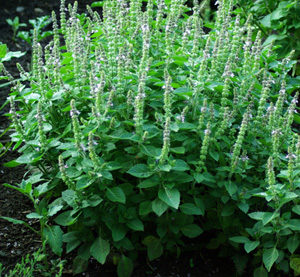Tulsi is grown in Miri and other parts of Sarawak by the Sikhs and other Indians.

First of all, the 'tulsi' plant or Indian basil is an important symbol in the Hindu religious tradition. The name 'tulsi' connotes "the incomparable one". Tulsi is a venerated plant and Hindus worship it in the morning and evening. Tulsi grows wild in the tropics and warm regions.
A Hindu household is considered incomplete if it doesn't have a tulsi
plant in the courtyard.
Thirdly, it is believed that having tulsi plants at home will dispel negative forces and prevent them from entering our homes and our minds.
Fourthly it is even known to purify or de-pollute the atmosphere and also works as a repellent to mosquitoes, flies and other harmful insects. Tulsi used to be a universal remedy in cases of malarial fever.
Prof
Shrinivas Tilak,( Concordia University, Montreal) cited a letter written to 'The Times,'
London, dated May 2, 1903 Dr George Birdwood, Professor of Anatomy,
Grant Medical College, Mumbai said, "When the Victoria Gardens were
established in Bombay, the men employed on those works were pestered by
mosquitoes. At the recommendation of the Hindu managers, the whole
boundary of the gardens was planted with holy basil, on which the plague
of mosquitoes was at once abated, and fever altogether disappeared from
among the resident gardeners."
According to one legend, Tulsi was the incarnation of a princess who fell in love with Lord Krishna, and so had a curse laid on her by his consort Radha. Tulsi is also mentioned in the stories of Meera and of Radha immortalised in Jayadev's Gita Govinda. The story of Lord Krishna has it that when Krishna was weighed in gold, not even all the ornaments of Satyabhama could outweigh him. But a single tulsi leaf placed by Rukmani on the pan tilted the scale.
We must really plant a lot of tulsi around our homes in Miri to repel mosquitors. That is a paramount task for us.


4 comments:
Thanks God, I come to read on time and I wish to order one of this plant, where can I order one?
I like this blog this is very impressive blog.I visit again & again for more and better information
I grew a lot in Singapore, Having a flask of this hot tea is refreshing to clear the nose.
An eldery friend said in the war, when chicken had weak legs due to malnutrition, this peppermint hleped the chicken.
If you live any where near an Indian family, you can ask the members. But I am sure you can get some information if you goggle. Thanks for visiting.
Post a Comment